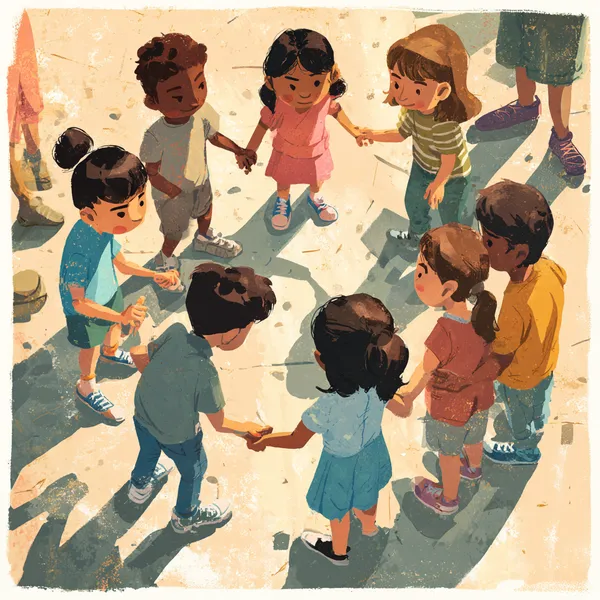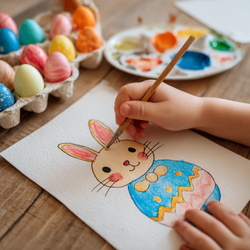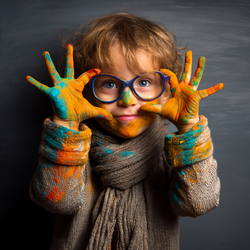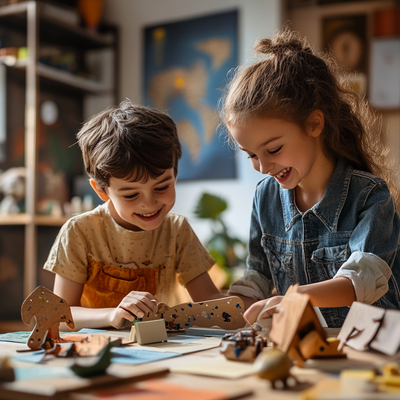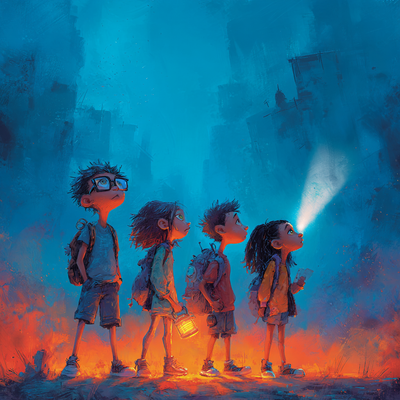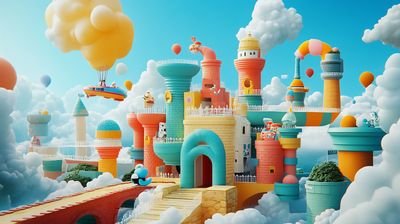Perfect! Here's the complete updated post #48 with the new Pirate's Duel resource:
Tyler and Mason are fighting again. Of course they are. This time it's over who gets to hold the shepherd's staff for our David story thing.
Both of them grabbing it yelling "I was first! No I was first!"
I'm just standing there like seriously? We go through this every single week with these two. They compete over literally everything. Who sits where. Who gets what color crayon. Who answers questions first. Who breathes the most air probably.
Finally I just grab the stupid staff away from both of them and go "You know what? Nobody gets to be the shepherd until you two figure out how to work together for like five minutes."
They both stare at me like I just told them to fly to the moon. Work together? What does that even mean?
And that's when it hit me. We spend so much time teaching kids to compete with each other. Be first. Be best. Win at everything. But when do we actually teach them to cooperate? To work together? To help each other succeed?
Never really. At least not intentionally.
Started thinking about my best volunteers and realized they're not the ones who always have to be right or in charge. They're the ones who know how to collaborate. Who listen to other people's ideas. Who help everyone succeed instead of just themselves.
Maybe I should be teaching kids that instead of just hoping they figure it out eventually.
This Human Knot Thing We Tried
Okay so this sounds totally ridiculous but hear me out.
Everyone stands in a circle and grabs hands with two different people who aren't standing next to them. So now they're all tangled up like some weird human pretzel.
Goal is to untangle themselves without letting go of anyone's hands.
First time we tried this it was complete chaos. Kids yelling at each other about which way to move. Some kids trying to force their way through. Others just standing there confused.
But slowly they started figuring out they had to actually talk to each other. Like really communicate. "Can you duck under my arm?" "Which way should I step?" "Wait let me move first then you can get through."
Tyler and Mason who were literally fighting five minutes before? Now they're coaching each other about how to twist around without falling over.
Took us like twenty minutes to untangle but nobody gave up. They were all problem solving together instead of trying to win individually.
Sometimes they end up in two separate circles which is technically success I guess. Sometimes they never figure it out at all and we just laugh and start over.
But they're working together instead of against each other for once.
Group Juggling That Got Crazy
Started simple. One ball. Kids in a circle. Toss to someone across from you, not next to you.
That person tosses to someone else following the same pattern. Keep going till everyone's caught and thrown once in a specific order.
Easy enough right? Then I added a second ball following the exact same pattern.
Now they're panicking because balls are coming at them faster than they expected. But they can't just focus on their own catching anymore. They gotta pay attention to where other people are throwing and help each other keep track.
Added third ball. Fourth ball. Now it's total chaos but good chaos because they're all encouraging each other when someone drops instead of getting annoyed.
"It's okay try again!" "I got it don't worry!" "Nice catch!"
Had this really shy kid Emma who never participates in anything volunteer to be the one who retrieves dropped balls. Made her feel important being part of the team effort even though she wasn't comfortable being in the main circle yet.
Goal isn't to see how many balls you can keep going. Goal is just to work together and keep trying. When everyone succeeds, everyone wins.
Tower Building With One Hand
Gave teams random junk. Blocks, cups, straws, tape, whatever I could find in the supply closet.
Challenge was to build the tallest tower possible in ten minutes. But the catch was they could only use one hand each. Other hand had to stay behind their back the whole time.
Totally impossible to build anything decent without helping each other. Someone holds the base while someone else stacks. Someone steadies while someone else balances the top part.
Mason who usually just takes over and does everything himself? Had to actually ask for help. Had to listen to other people's ideas about what might work better.
"Can you hold this while I put this piece on top?" "What if we try putting the cups on bottom instead?" "Your idea is actually better than mine let's try that."
Some towers fell over immediately which was hilarious. Some got pretty tall before toppling. Didn't really matter because they were all working together to figure it out.
Blanket Bounce Game
Got an old sheet from the closet. Had kids hold the edges all around and try to bounce a ball on it.
Sounds simple but requires everyone to move together or the ball goes flying off somewhere random.
Start with just trying to keep a tennis ball from falling off. Then try to bounce it higher. Then try to bounce it toward a specific kid.
Everyone has to pay attention to what everyone else is doing or the whole thing falls apart immediately.
Added a second ball which made it way harder. Then a beach ball. Then tried bouncing a ball back and forth between two different blankets which was basically impossible but they loved trying.
Kids were laughing and cheering when they managed to keep the ball bouncing for more than a few seconds. Celebrating together instead of competing against each other.
Silent Lineup Challenge
Told kids they had to line up in order of their birthdays without talking at all. No words allowed whatsoever.
Watching them try to communicate birth months using only hand gestures was absolutely hilarious. Lots of pointing and holding up fingers and drawing numbers in the air.
Some kids trying to act out seasons. One kid doing this elaborate dance that was supposed to represent December apparently. Another kid pointing at imaginary snowflakes for a winter birthday.
Took forever but they eventually figured it out mostly. Few kids ended up in wrong spots but close enough.
Then we tried by height which should have been easy but somehow wasn't. Then alphabetical order by first name which required kids to figure out how to spell each other's names using charades basically.
Point wasn't to do it perfectly. Point was learning to pay attention to each other and find ways to communicate that didn't involve just talking louder than everyone else.
Drawing Together
Each team gets one piece of paper and one crayon. That's it.
They have to draw a picture together but only one person can hold the crayon at any time. Every minute or so I yell "switch" and the crayon has to pass to the next person.
Can't plan ahead what you're drawing. Have to build on whatever the previous person started. Have to adapt and work with what you're given instead of starting over.
Tyler who always wants to control everything? Had to watch other kids add their own ideas to his perfect plan. And shockingly the world didn't end when someone drew something different than what he had in mind.
Some pictures turned out looking like abstract art created by aliens. Others actually looked like recognizable things. All of them were way more creative than anything one kid could have drawn alone.
Kids started building on each other's ideas instead of trying to change them. "Oh you drew a house! I'll add some flowers!" "That looks like it could be a car if I add wheels here!"
Balloon Keep Up
One balloon. Goal is to keep it in the air as long as possible working as a team.
But each kid can only hit the balloon once before someone else has to hit it. Can't have one kid doing all the work.
Started counting how many hits they could get before the balloon touched the ground. First try was like six hits. Then twelve. Then twenty-three.
Kids were diving across the room to keep the balloon up. Calling out each other's names to make sure everyone got a turn. Celebrating when they beat their previous record.
Nobody was keeping track of who hit it most or who made the best saves. They were all just focused on the team goal of keeping the balloon up as long as possible.
Puzzle Pieces
Got a jigsaw puzzle and gave each kid random pieces without letting them see what the final picture was supposed to look like.
They had to work together to figure out what they were building and how their pieces fit together.
Some kids good at finding edge pieces. Others good at matching colors. Others good at seeing patterns and shapes.
Couldn't hoard pieces or work on separate sections. Had to share information and help each other figure out where things belonged.
"I think this piece has part of a tree on it." "Mine has blue that might be sky!" "Anyone have a piece that looks like it connects to this red part?"
Took way longer than if they'd worked individually but they were all invested in solving it together.
Trust Walk Thing
Paired kids up. One closes their eyes, the other guides them around the room using only words. No touching allowed.
Then switch so both kids get to lead and follow.
Kid with eyes closed has to trust their partner completely not to let them walk into a wall or trip over a chair. Kid guiding has to really pay attention and give clear directions.
Started simple with just walking a straight line. Then added obstacles like chairs and other pairs to navigate around.
Some kids were terrified to close their eyes at first. Others loved the challenge. All of them learned to communicate way more clearly than usual.
"Take three small steps forward. Now stop. Turn a little to your right. Okay now you can keep walking straight."
Builds trust in ways competitive games never could.
Finding More Cooperation Games
When looking for Youth Group Games that actually build teamwork instead of just creating more competition, resources matter.
Found Pirate's Duel recently - team-based game where groups work together strategically. Type of game where cooperation and communication determine success, which is exactly what kids need to practice instead of just competing against each other.
What Actually Makes These Work
No winners or losers. Everyone succeeds together or everyone struggles together. Takes pressure off individual performance.
Kids have to actually listen to each other instead of just waiting for their turn to talk.
Individual talents matter but only if they contribute to group success.
Mistakes become learning opportunities instead of reasons to give up or get mad at someone.
Shy kids find ways to participate that don't require being the loudest or most confident.
Kids learn that different people bring different strengths and that's a good thing, not a problem to solve.
When It Goes Wrong
Some kids still try to take over and do everything themselves. Need constant reminders that the point is working together.
Some kids give up when things get difficult. Team has to learn to encourage instead of criticize.
Some kids get frustrated when others don't do things exactly their way. Good practice for real life honestly.
Sometimes groups get completely stuck and need hints to get unstuck.
Occasionally a kid just refuses to participate which is fine. They can watch and maybe join later when they see others having fun.
What I've Actually Noticed
Tyler and Mason still compete over stuff sometimes but now they also automatically help each other when working on projects.
Kids started encouraging each other in other activities even when I don't tell them to.
Group work goes smoother because they've practiced listening to different ideas instead of just pushing their own.
Even really quiet kids contribute ideas because they've learned their input actually matters.
Parents telling me kids are applying cooperation skills at home with siblings instead of just fighting constantly.
Kids celebrate when their friends succeed instead of just focusing on their own achievements.
Why This Actually Matters
Real life requires way more cooperation than competition. School projects, jobs, relationships, parenting - all about working with other people, not against them.
Kids need to learn early that everyone has different strengths and perspectives and that makes teams stronger, not weaker.
Cooperation builds empathy because you have to actually pay attention to other people's needs and ideas.
Success feels better when you achieve it together instead of at someone else's expense.
Kids learn to value relationships and process, not just winning and being right all the time.
Current Favorites
Human knot for groups that need practice with patience and communication.
Tower building for hands-on kids who love construction challenges.
Blanket games for active kids who need to move while learning.
Silent lineup for chatty kids who need practice listening instead of talking.
Group juggling because all ages can participate at their own level.
Real Goal Here
Not trying to eliminate competition completely. Sometimes friendly competition is motivating and fun.
But kids need balance. Need to know how to work with people, not just against them.
These games teach life skills they'll use forever. Listening. Compromising. Building on other people's ideas instead of dismissing them.
Celebrating team achievements instead of just individual success.
Tyler and Mason? Still compete over random stuff because that's who they are. But last week I watched them automatically team up to help a new kid who was struggling with a craft project without me saying anything.
That's when you know cooperation lessons are actually sticking in their brains.
Watch YouTube
Listen to Podcast


